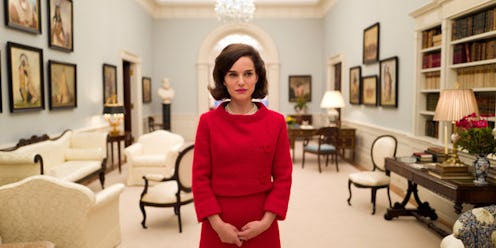
Though she certainly isn't the first actress to play Jackie Kennedy in a film, Natalie Portman will portray the former First Lady in a movie that attempts to tell a different story. Portman's new movie, Jackie, directed by Pablo Larraín, is an intimate portrait of Jackie following the 1963 assassination of her husband, President John F. Kennedy. While the latest teaser trailer for the biopic, which comes out Dec. 2, shows there will be flashbacks to better times of their life in the White House, the bulk of the story deals with how Jackie spent those last days in the house she called her home before Lyndon B. Johnson officially became the new President. Her story often ends with the loss of her husband, casting her as the eternally grieving widow. But, a new trailer for Jackie shows her in a different light as the example of strength that helped a nation through a confusing and tumultuous time, despite the sadness that she must have felt.
The film clearly isn't shying away from the grief that Jackie felt after her husband's death. The melancholy trailer is filled with Portman's emotionless gaze, which scans the crowd that gathered to say goodbye to her husband. It shows her in the shower, blood, not her own, dripping down her back. It shows her sitting despondent in that iconic pink Chanel suit next to the casket carrying her husband. With each of these scenes, Portman manages to say so much by doing very little. It was something the real Jackie also did, even if it went unnoticed.
In 2014, Vanity Fair took a deeper look at what Jackie's life was like in the winter of 1963 to 1964 when she was having flashbacks of the assassination. Now it would be called post-traumatic stress disorder, but then it was just something she dealt with in secret. She reportedly went over that moment in her mind, wondering how she could have saved her husband. Back then, no one knew how much of a rock Jackie was for her husband, who dealt with his own health problems. She protected him in the press, putting herself on the line to make sure he could do his job. But, after his death, she was the symbol of a country's pain.
With this film, which includes Theodore H. White's Life magazine interview with the widow at Hyannis Port, Massachusetts a week after JFK's death, there is that sense that Jackie's suffering isn't portrayed as weakness. Instead, it finds the quiet strength in grief. This movie is a story that couldn't have been told back then, mainly because the idea of Jackie Kennedy was that she was the perfect example of a First Lady. She stood by her husband, even when times were tough, sweetly giving tours of the White House that she had redecorated. Her look was iconic, one that women all over wanted to copy. But the idea that she was more than a pretty face wasn't something most could comprehend at the time. She was a supporting player to the President and even after his death became best known for who she had lost, not who she was. She beautifully grieved and the world sadly watched, wondering how she could go on.
But, Jackie's story is much more nuanced than pictures of her from that time can express. Even Kennedy's daughter, Caroline, would go on to say in the foreword of the 2011 book, Jacqueline Kennedy: Historic Conversations on Life With John F. Kennedy that no one really knew her mother, they just had an idea of who she was. One that was mostly formed in those days after she lost her husband. “They don’t always appreciate her intellectual curiosity," Caroline wrote, "her sense of the ridiculous, her sense of adventure, or her unerring sense of what was right." It's why this film's importance won't be measured in Oscar nominations or awards, but its ability to rewrite history as America knows it. Jackie Kennedy had a story to tell and it was one that was much richer than most wanted to imagine. Now, thanks to Jackie, everyone will be able to see that.
Image: Fox Searchlight Pictures